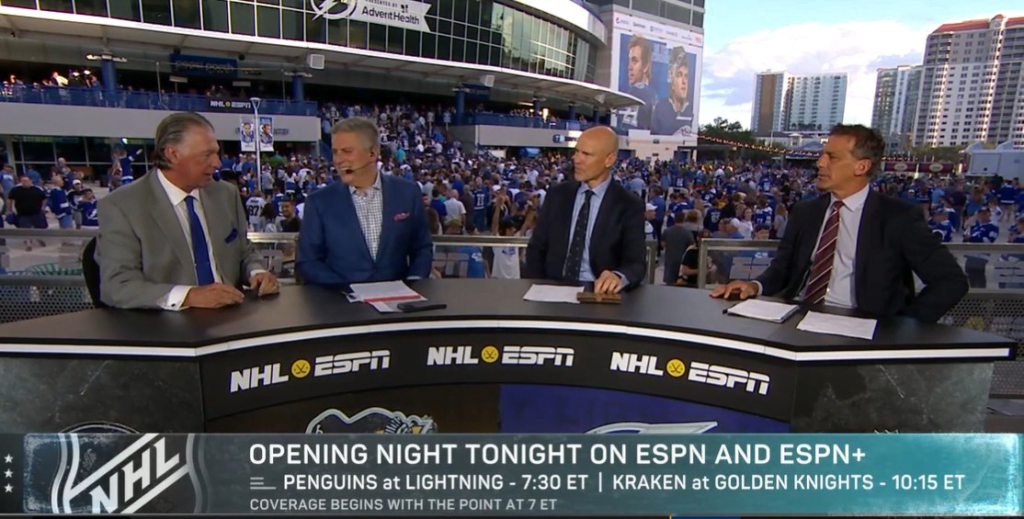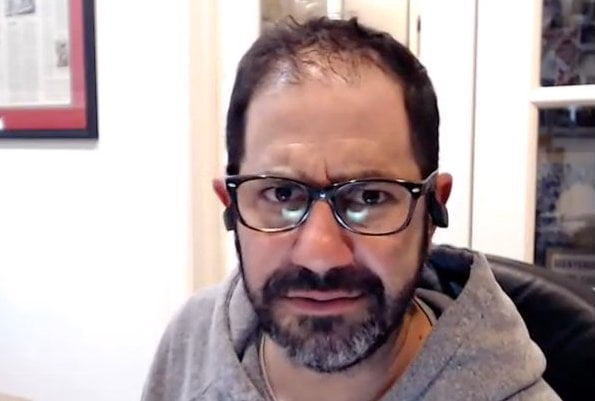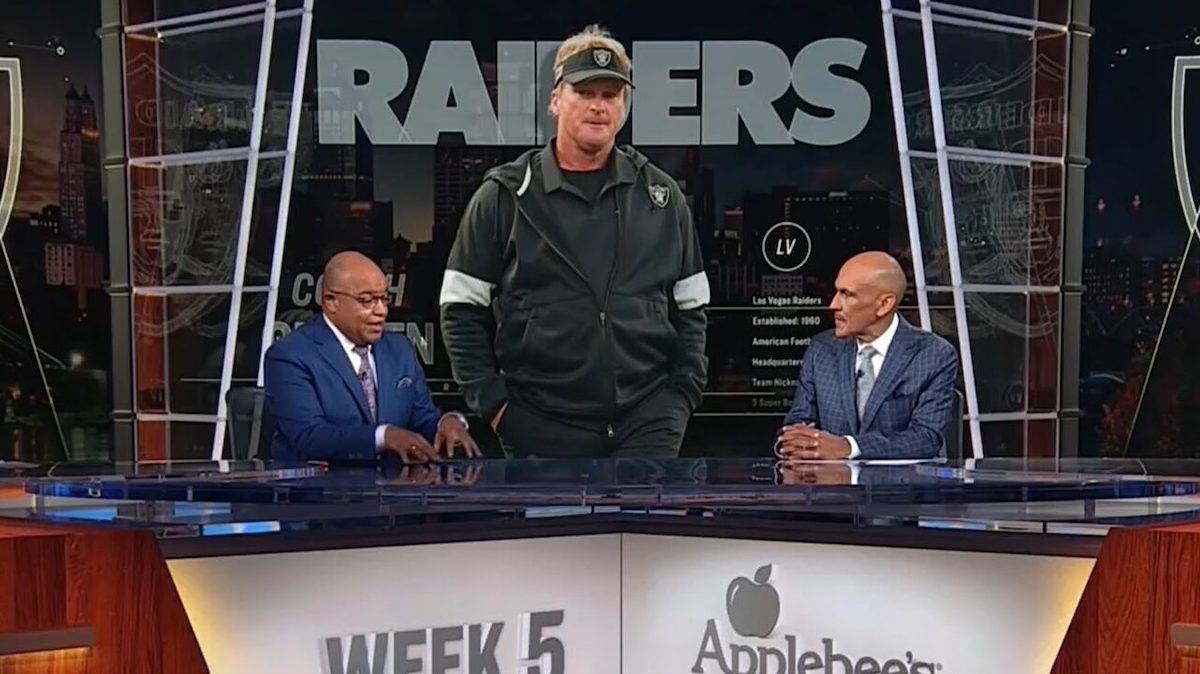Did you enjoy the NHL’s return to ESPN on Tuesday? I will admit that it was great to hear the music again and the presentation was pretty strong. Overall though, I got more enjoyment out of the goofy things the network did leading up to the start of the new season than the games themselves.

That is pretty understandable I think. I grew up in Mobile, AL where we had an ECHL team that moved after two seasons because they could not keep the ice on the rink frozen. Being a hockey fan was never really in the cards for me. On top of that, I am way more of a sports media fan than anything else anyway.
One thing that I have seen a lot in the lead-up to the new season is that the NHL and its two new TV partners are going to make an effort to grow the league’s popularity with the Latino audience. That means getting Americans of Latin descent to watch more hockey and getting games on in Mexico.
The NHL’s Deputy Commissioner Bill Daly spoke to ESPN’s Eric Gomez about this recently. He said that the league has its eyes on actually playing in Mexico. An expansion team in Mexico City is unlikely, but the league could build an international event game similar to its outdoor games started by the league and NBC.
“We had started hearing from our clubs that they’d love to play a game in Mexico,” said Daly. “The more we can appeal to more demographics, countries and culturally diverse areas, the better it is for us.”
I wondered how effective a move like this would actually be. Does a single game in Mexico each year raise the NHL’s profile in the Latin community in the United States? Does it even raise the profile of the NHL in Mexico more than one day, maybe one week at most, each year?
I turned to friends that have a history with hockey and are of Latin descent. They also both happen to work in the sports media. I thought they would have discerning eyes to and be able to offer perspective about what is going on here that a white dude from Alabama just wouldn’t have.
Mike Taylor’s show can be heard in afternoon drive on Ticket 760 in San Antonio and on AM 1300 The Zone in Austin. Prior to joining the San Antonio station, Taylor, who is of Mexican descent, hosted the postgame show for the Dallas Stars on WBAP in Dallas.
He gives the league credit and believes the effort to woo a Latino audience will be genuine. He has seen teams in both the NHL and AHL recognize the value of winning over those fans.
“It’s not lip service. Clubs in the South especially want to grow the game however they can,” he told me in an email. “The question is how? Dallas has done a pretty good job and before they left San Antonio, the Rampage tried to tap into the Mexican heritage of the city. And it worked. Many Latinos went to those games.”

Joe Ovies has been on the air in Raleigh, North Carolina for more than 20 years. He covered the Carolina Hurricanes’ 2006 Stanley Cup Championship for 850 The Buzz and now hosts The OG in afternoon drive on the team’s flagship station, 99.9 The Fan. In fact, Ovies and his partner, Joe Giglio, made headlines earlier this year for blasting the team after it signed Tony DeAngelo, saying it proved that ownership was out of touch with the market.
Ovies, whose parents are from Cuba, has questions about how the league, along with ESPN and TNT, plan to court “the Latino audience.” It’s not something that can be done successfully by employing a single strategy. He says he has seen ESPN make that mistake every time it tries to celebrate “Latino Culture”.
“For instance, they had a vignette on Tom Flores and his impact on Mexican NFL fans. It was incredibly well done, highlighting fans who viewed Flores as an inspiration and a rare representative of Mexican heritage in the NFL. However, as someone of Cuban descent, those cultural signifiers do not resonate with my upbringing in South Florida in any way, shape, or form.
“While I appreciate Mexican culture and go out of my way to point out its influence in this country, it can’t hit me the same way ESPN’s coverage of the MLB in Cuba did. And I would expect those fans of Mexican would have a vice versa understanding of it.”
Each of the United Sates’ “big four” sports leagues have left the country in the past. That doesn’t just mean games were played in Canada, where three of the four leagues have teams. The NFL has played games in England and Mexico. Major League Baseball has gone to Cuba, Japan, and England. The NBA has visited four foreign countries for regular season games and ten others during past preseasons.
The NHL itself is no stranger to travel. The league’s Global Series games began back in 1997, but since 2000, the events have been confined to European countries where there is already some kind of hockey culture. Going to Mexico and even wooing Hispanic American fans is a different challenge entirely.
ESPN, TNT and the NHL seem to understand that success will require some education. There is likely a significant portion of the audience that has the same relationship to hockey that most Americans do with hurling. We know it exists, we know it is a sport, and that is where our knowledge stops.
If that’s a hill the three entities have to climb, Mike Taylor is adamant that anyone with a financial stake in hockey’s success needs to understand that taking a game to Mexico won’t be good enough. In fact, while it may make an impact in Mexico, Taylor doesn’t think that it will mean much of anything to Mexican-Americans.
“Mexican-Americans are who the NHL needs to focus on. It may sound silly but these teams simply need to do more Mexican-type stuff. Serve authentic Mexican food and promote the hell out of it. Do what a bunch of minor leave baseball teams have done and create an alternate team name that’s Latino-centric. Hire Latin musical stars to play concerts. Get local soccer stars to come to games. Have a low rider show in the parking lot. Some of this may sound stereotypical but if you want Mexican kids to come out, you have to do Mexican things.”
When it comes to ESPN specifically, Ovies is a little more skeptical. He doesn’t see a network that wants to bring hockey to a new audience. He sees a business that needs to make its money back and win over the audience that is already there.
“ESPN paid a lot of money for the rights and investing in NHL coverage to earn back a level of trust with hockey fans who have held a grudge against the network’s lack of coverage for over a decade. When you pay that much money, you have to get your bang for the buck. So I think they went to their binder of ideas that have worked for other leagues, like the NFL, and said ‘hey let’s try this! It’ll look cool and there’s outreach!'”
Ovies’s exposure to hockey dates back to his childhood in South Florida when the Panthers first came to the NHL. His father was a big sports fan and wanted his sons to see big names like Wayne Gretzky play before it was too late. He admits that not enough Cuban dads thought that way. That is why the Panthers left Miami for the suburbs.
Still, he says there is a lesson in that for the NHL. The key to winning over Latinos, or any new audience really, isn’t creating spectacles. It is creating personal connections and memories.
Joe’s son, Jacob, is a huge Hurricanes fan and even participates in the team’s First Goal program. Joe told me that it was possible because of a learn-to-skate program subsidized by the team. The Canes made it easy for anyone who wanted to learn to play to be able to do so.
That hasn’t just created loyalty to the team from his son. Joe told me that it strengthened three generations of his family’s bond with hockey.
“Here you have a 10-year-old kid with a Cuban dad born in the states to Cuban immigrants going through a highly subsided NHL team learn-to-skate program. That leads to house league participation in the Triangle, where he’s playing games on the weekend.
“My dad goes to his first game and is all emotional about it. Essentially tells me ‘my dad was the soccer player, your mom’s dad was the baseball player…you were a good baseball player too…but Jacob is the first Ovies to play hockey…your grandfathers would love this.'”

Taking those learn-to-skate programs and roller hockey leagues to Latino communities in the United States would be exactly like Major League Baseball’s efforts to rebuild fandom for its sport in Black communities. Equipment in both of those sports can be expensive. That is why you get teams and current and former players involved to lower the barrier to entry.
Look, the NHL absolutely should be looking at how to attract these audiences it has ignored for so long. Auston Matthews, one of the league’s biggest stars, is a Mexican-American playing for one of the league’s Original Six franchises.
I can’t stand hockey fans that tell me I don’t like the sport because I haven’t given it a chance. I have. I think it is dumb. What I like about hockey is that my kids like hockey, so we go to games together.
There are plenty of people and communities that “haven’t given it a chance” though because the NHL never gave them a chance. If the league and its partners focus on how to introduce hockey to those communities and make meaningful connections with them, it would be making a smarter investment than creating a major event that pays lip service to that community for a few days every year, thinking that will make them so grateful to be acknowledged that they run out and buy hats and hoodies.

Demetri Ravanos is a columnist and features writer for Barrett Media. He is also the creator of The Sports Podcast Festival, and a previous host on the Chewing Clock and Media Noise podcasts. He occasionally fills in on stations across the Carolinas in addition to hosting Panthers and College Football podcasts. His radio resume includes stops at WAVH and WZEW in Mobile, AL, WBPT in Birmingham, AL and WBBB, WPTK and WDNC in Raleigh, NC.
You can find him on Twitter @DemetriRavanos or reach him by email at DemetriTheGreek@gmail.com.







